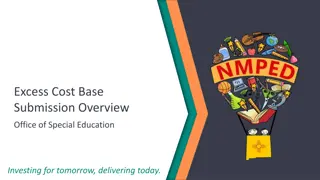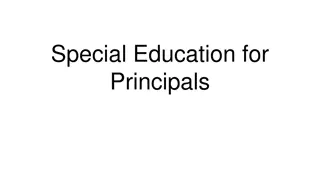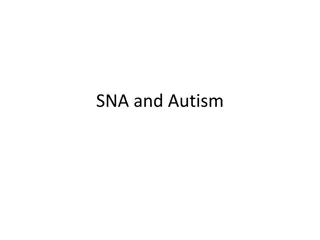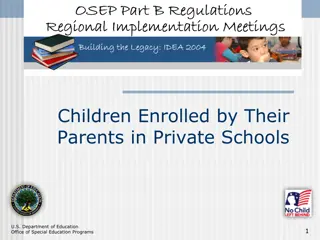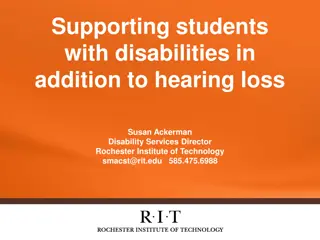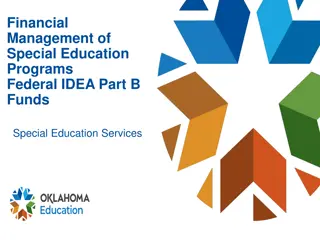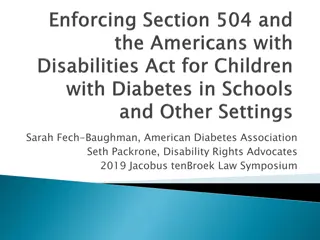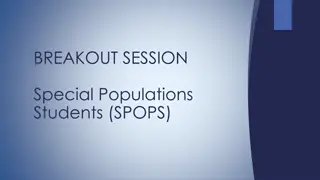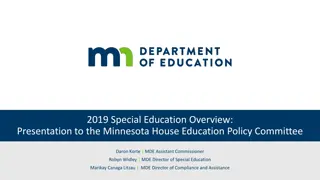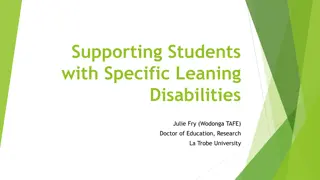Special Education and Supporting Children with Different Disabilities
This content provides valuable information on special education processes, the Perry County Special Services Team, dealing with various disabilities such as autism, developmental delay, and deaf/blindness, and practical tips for supporting children with special needs. It emphasizes the importance of patience, resilience, positive reinforcement, and effective communication strategies. Parents, educators, and caregivers can benefit from the insights shared here to create a nurturing and inclusive environment for children with disabilities.
Download Presentation

Please find below an Image/Link to download the presentation.
The content on the website is provided AS IS for your information and personal use only. It may not be sold, licensed, or shared on other websites without obtaining consent from the author. Download presentation by click this link. If you encounter any issues during the download, it is possible that the publisher has removed the file from their server.
E N D
Presentation Transcript
Special Talks Perry County Schools
Perry County 2023 Parent Training
Perry County Special Services Team Coordinator- Sherry Saulsberry Elanie Evans- Chairperson 4-8 @ Francis Marion Zanetta Whitt- Chairperson K-12 @ R.C. Hatch Gwendolyn Austin- Speech/Language Pathologist Karen Barton- Gifted Specialist Jerri Coleman- Grades10-12 Jonathon Moore Grades 7-9 Shaniqua Moore- SpEd Teacher K-3 Meredith Wiggins-Mental Health Specialist
Special Education Process IEP IEP Eligibility Eligibility Placement Placement Evaluation Evaluation Referral Referral Annual Annual Review Review Instruction Instruction
Thirteen Disability Areas Autism Developmental Delay Deaf/Blindness Emotional Disability Hearing Impairment Intellectual Disability Multiple Disabilities 1. 2. 3. 4. 5. 6. 7.
Thirteen Disability Areas 8. Orthopedic Impairment 9. Other Health Impairment 10. Specific Learning Disability 11. Speech or Language Impairment 12. Traumatic Brain Injury 13. Visual Impairment
Dealing with Autism Be patient. ... Teach the child how to express anger without being too aggressive. ... Be persistent but resilient. ... Always stay positive. ... Ignore irritating attention-getting behavior. ... Interact through physical activity. ... Be affectionate and respectful. ... Show your love and interest
Dealing with DD (Developmentally Delayed) Monitor your child's feelings Help your child understand Try to keep routines Spend some time outside each day, if possible Model behavior & coping skills Take care of yourself Prioritize what works for your child and family
Dealing with a child who is deaf or blind Talk face to face so the child can lip read Make sure you check his hearing aids/Cochlear implants every day and that you know where to go for help. Respond to him with talk and smiles. Explain the activities Allow them to touch or walk through activities before they try them. Allow them to explore the parameters when possible in new places. Explain what other children are doing, too, so they can watch by listening.
Dealing with a child who is ED Emotionally Disabled Keep rules/activities simple and clear Reward positive behaviors Allow for mini-breaks Fair treatment for all Use motivational strategies
Dealing with ID-intellectual disability Encourage independence in your child. For example, help your child learn daily care skills, such as dressing, feeding him or herself, using the bathroom, and grooming. Give your child chores. Keep age, attention span, and abilities in mind.
Dealing with orthopedic impairment Special seating arrangements to develop useful posture and movements. Instruction focused on development of gross and fine motor skills. Securing suitable augmentative communication and other assistive devices. Awareness of medical condition and its affect on the student (such as getting tired quickly)
Dealing with a speech or language impairment Practice. ... Focus on what the child can do instead of overemphasizing what he or she can't do. ... Keep background noise and distractions to a minimum during learning sessions and at other times too. ... Listen! ... Use straws (M, P, and B) Read. ... You can make a difference.
Dealing with ADHD Limit screen time Maintain a positive attitude. ... Create and maintain the structure. ... Communicate rules and expectations. ... Encourage movement and sleep. ... Focus on social skills. ... Engage help from the school Use jigsaw puzzles to help with focusing
Test Taking Tips Get a full night s rest Eat a healthy breakfast Bring a jacket or sweater (cold natured) Dress light or layers (hot natured) Write a check-out note Bring a snack: banana, apple, chips Be on time
Tips for helping your child at home Check the book bag daily Ask about school daily Did anything out of the ordinary happen today? Listen to your child read Communicate regularly changes in medication or habits. Check your child s grades regularly.
The Big Picture Teaching current students how to advocate for themselves is obviously crucial to their post-school success. When parents and teachers partner with students and promote self-advocacy skills to students with disabilities, students will achieve more independence and success beyond high school.
Special Education Laws IDEA - The Individuals with Disabilities Education Act is a law that makes available a free appropriate public education to eligible children with disabilities throughout the nation and ensures special education and related services to those children. ADA Americans with disabilities act prohibits discrimination against people with disabilities in several areas, including employment, transportation, public accommodations, communications and access to state and local government programs and services.
A Message From The Team We understand that dealing with a child with any type of disability can be a daily challenge. We want to emphasize to you that some of us are going through the exact same things you are going through. Just know we understand and are available to listen and make the necessary adjustments based on your child s needs. Thank you
Contact Information Coordinator- sherry.saulsberry@perrycountyal.org 334-292-5293 Elanie Evans- eevans@perrycountyal.org Zanetta Whitt- zwhitt@perrycountyal.org Gwendolyn Austin- gaustin@perrycountyal.org Karen Barton- kbarton@perrycountyal.org Jerri Coleman- jmcoleman@perrycountyal.org Jonathon Moore jonathan.moore@perrycountyal.org Shaniqua Moore- sdmoore@perrycountyal.org Meredith Wiggins-meredith.wiggins@perrycountyal.org




